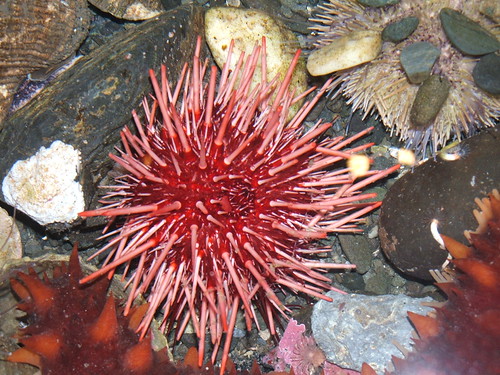Today, I kick some neat echinoblogin' with a bang of a question!
How long can sea urchins live?
Answer: Long.
The info which follows is from a really neat paper by Tom Ebert (Oregon State University) and John Southon (Lawrence Livermore National Labs) in NOAA Fisheries Bulletin and can be found here. A more easily accessible popular account can be found here.
Strongylocentrotus franciscanus is the largest sea urchin on the west coast of North America and is one of the more prominent "target species" in the booming sea urchin fishery of this area.
 It turns out that because of nuclear weapons testing in the 1950's there is a permanent marker in "carbonate-based skeletal elements" . They looked at tetracycline markers in conjunction with these radiocarbon tags on teeth from the "aristotle's lantern" or "jaw" from the urchin.
It turns out that because of nuclear weapons testing in the 1950's there is a permanent marker in "carbonate-based skeletal elements" . They looked at tetracycline markers in conjunction with these radiocarbon tags on teeth from the "aristotle's lantern" or "jaw" from the urchin.
 And here we see Jaw length from their Fig. 2 plotted against age.....This clearly shows a VERY different age maxima then what was known from before. Previously, S. franciscanus was thought to have only lived about 7 to 10 years...
And here we see Jaw length from their Fig. 2 plotted against age.....This clearly shows a VERY different age maxima then what was known from before. Previously, S. franciscanus was thought to have only lived about 7 to 10 years...
 In fact, according to the authors, the LARGEST of this species from British Columbia, Canada with body diameters over 19.0 cm and jaw lengths over 2.8 cm would be EXPECTED TO BE AROUND 200 YEARS OLD!!!!
In fact, according to the authors, the LARGEST of this species from British Columbia, Canada with body diameters over 19.0 cm and jaw lengths over 2.8 cm would be EXPECTED TO BE AROUND 200 YEARS OLD!!!!
Lytechinus variegatus (4 years)
Strongylocentrotus nudus (6 years)
Psammechinus miliaris (7 years)
Paracentrotus lividus (8 years)
Sphaerechinus granularis (9 years)
Evechinus chloroticus (10 years)
Psammechinus miliaris (10 years)
Strongylocentrotus intermedius (10 years)
Echinus acutus var. norvegicus (11 years)
Loxechinus albus (11 years)
Echinus esculentus (12 years)
Allocentrotus fragilis (15 years)
Echinus elegans (21 years)
Strongylocentrotus droebachiensis (24 years)
Echinus affinis (28 years)
Sterechinus neumayeri (40 years)
Sterechinus antarcticus (75 years)
 |
| This excellent photo from NatureDiver |
As part of the general fishery of sea urchins in general, ecologists have tried to make estimates of age in order to try and estimate how long a population of this species would theoretically take to restock...and this ties into other important questions such as how long they remain reproductively active and so forth.
Prior studies attempted dyes and stains in order to try and capture regular cycles in the spines and so forth. But a lot of these studies turned out to be...problematic.
Red Sea Urchins lack interpretable growth zones and tags used between 1 year tag and recapture could miss good years of growth...among other things.
Ebert & Suthon found an unusual new marker they used to address this question of sea urchin age...
Radiocarbons from atomic bombs!!!
 It turns out that because of nuclear weapons testing in the 1950's there is a permanent marker in "carbonate-based skeletal elements" . They looked at tetracycline markers in conjunction with these radiocarbon tags on teeth from the "aristotle's lantern" or "jaw" from the urchin.
It turns out that because of nuclear weapons testing in the 1950's there is a permanent marker in "carbonate-based skeletal elements" . They looked at tetracycline markers in conjunction with these radiocarbon tags on teeth from the "aristotle's lantern" or "jaw" from the urchin. And here we see Jaw length from their Fig. 2 plotted against age.....This clearly shows a VERY different age maxima then what was known from before. Previously, S. franciscanus was thought to have only lived about 7 to 10 years...
And here we see Jaw length from their Fig. 2 plotted against age.....This clearly shows a VERY different age maxima then what was known from before. Previously, S. franciscanus was thought to have only lived about 7 to 10 years...
It turns out that the red sea urchin (S. franciscanus) (like the one below) can live to be OVER ONE HUNDRED YEARS OLD!!!

What's perhaps even more amazing is that long-lived urchins like this retain their ability to reproduce! A quote from Dr. Ebert:
They can die from attacks by predators, specific diseases, or being harvested by fishermen. But even then, they show very few signs of age. The evidence suggests that a 100-year old urchin is just as apt to live another year, or reproduce as a 10-year old sea urchin.
And how does this compare with other known species?
Other Compared Sea Urchins (click on each for more info!) & Maximum Age in Years (but note that these were assessed using older methods)
Lytechinus variegatus (4 years)
Strongylocentrotus nudus (6 years)
Psammechinus miliaris (7 years)
Paracentrotus lividus (8 years)
Sphaerechinus granularis (9 years)
Evechinus chloroticus (10 years)
Psammechinus miliaris (10 years)
Strongylocentrotus intermedius (10 years)
Echinus acutus var. norvegicus (11 years)
Loxechinus albus (11 years)
Echinus esculentus (12 years)
Allocentrotus fragilis (15 years)
Echinus elegans (21 years)
Strongylocentrotus droebachiensis (24 years)
Echinus affinis (28 years)
Sterechinus neumayeri (40 years)
Sterechinus antarcticus (75 years)
Based on this, I suppose its probably a good thing that the red sea urchin uni isn't considered quite as tasty as the purple sea urchin uni!
Chris,
ReplyDeleteYou've got a wealth of information. Great site!
In light of the new evidence on S. franciscanus, couldn't those other "known maximum ages" be conservative as well?
ReplyDeleteI was also wondering about the given ages of those other urchins, and if they are a bit off as well. Any updates on these ages? Also, nothing on Strongylocentrotus purpuratus?
ReplyDeleteIs the age a fact?
ReplyDelete